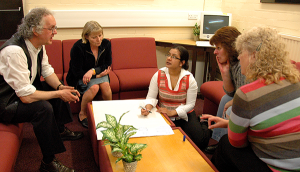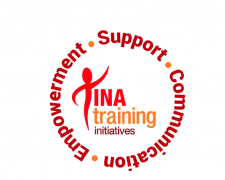
Getting 'unsquashed'
Where we're coming from....
We each constitute the other's environment and exert a powerful influence
on the extent to which we fulfil our individual and collective potential.
Relaxation
To 're-lax' means literally to 'get loose again' - to bounce back - to get 'unsquashed'.
The groups we belong to can nurture us, and support our growth, providing us with 'maps of the world' and a sense of identity and belonging. However, when conforming to the expectations of others becomes more important than sharing who we are and what we really think and feel, the consequences for personal development and forging mutual understanding can be disastrous.
Schools, workplaces and families sometimes exert a subtle (or sometimes not that subtle actually) 'squashing' influence on people, which can last for a lifetime.
A 'squashed' individual is less likely to be aware of her/his potential, or to realise that potential in contributing to the 'project' (whatever you consider the project to be).
It is those set free to think for themselves, who will have the most to contribute to the development of an organisation.
Oh, and 'squashed' people are more likely to be stressed, miserable, de-motivated and unfulfilled.
In Emotional Intelligence, published in 1995, Daniel Goleman wrote
"The cost-effectiveness of emotional intelligence is a relatively new idea for business". Considering "the destructive effects of miserable morale" he argues that "when emotionally upset, people cannot remember, attend, learn, or make decisions clearly... ...Stress makes people stupid."
Stress is inevitable - how do we best support each other to cope with it? How do we maximise our resilience?
Many of us have worked in organisations where people 'joked' that 'floggings would continue until morale improved'. The 'joke' of course, reflects a common appreciation of the reality, which is that people will not be 'punished' into more enthusiastic and motivated performance.
(Too) many managers and (too) many of those they manage would, even today, consider that the art of management chiefly consists in telling people what to do and getting them to do it.
We agree with Goleman that "Leadership is not domination, but the art of persuading people to work toward a common goal.
And, in terms of managing our own career, there may be nothing more essential than recognising our deepest feelings about what we do - and what changes might make us more truly satisfied with our work."
Building Confidence
Are there particular circumstances where you feel relaxed, empowered and able to communicate? Are there other times when you just want to be somewhere else, anywhere else?
It's difficult to communicate with people you don't trust, but it's very difficult to trust people you feel you can't communicate with.
People are frightened when they feel they don't know the people they're with.
People are frightened when they feel the people they're with don't know them.
People are frightened of other people knowing that they're afraid.
This fear is counterproductive.
It inhibits...
Co-operation
Spontaneity
Creativity
Effective working partnership
Optimum performance
If I feel that your ambitions are likely to swamp or obliterate mine, as in - "I'm hungry-you're dinner" - my communication with you will be fearful, confined to whatever I feel I need to do or say to stay out of your clutches. It is highly unlikely that we will get to know each other or share a common purpose.
Roald Dahl's Big Friendly Giant is only able to forge a co-operative relationship with Sophie once she's realised that he's not going to eat her.
How do we overcome our fears to establish a healthy reciprocal working relationship?
How do we begin to replace suspicion with trust?
Communication - the goal
Getting to know the people you work with will be the making of your organisation!
The most successful organisations are created and maintained by people who communicate effectively and who are prepared to manage the tension between a necessary conformity to group expectation, and support for individual creativity, spontaneity of thought and expression of feeling.
A good team will...
Know the strengths and weaknesses of its constituent players
Share a sense of value and purpose
Comprise individuals prepared to nurture, encourage and challenge each other
Communication is an end in itself.
It is how we survive, create products, build civilisations.
It sustains and encourages.
It's what we're here for and it's how we become who we are.
Getting 'unsquashed' might lead us to recognise that...
We have a right and a responsibility to express ourselves.
The people we don't want to listen to often have the most to teach us.
Situations we'd avoid if we could sometimes lead us to discover strengths we didn't know we had.
Most of us need constant reminders of the above.
An enhanced awareness of the abundance of creative energy in the team, a sense of 'belonging', respect and shared purpose will regularly and predictably result in a happier and more productive workplace, classroom or home.

